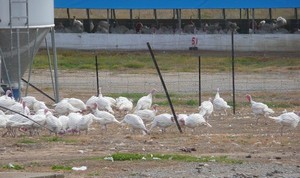Protection against Mycoplasma gallisepticum for turkeys
Published: October 7, 2013
By: Poultry CRC
The Poultry CRC is supporting an 18 month research project aimed at the development of a live vaccine for the control of Mycoplasma gallisepticum (MG) related chronic respiratory disease in turkeys. The project being headed by Bioproperties R&D Manager, Dr Rima Youil, is a collaborative effort between The University of Melbourne and Bioproperties Pty Ltd. The research, titled Development of a temperature sensitive Mycoplasma gallisepticum vaccine for use in Turkeys, is expected to be completed in March 2014.
 Turkeys on a commercial farm
Turkeys on a commercial farmRima explained, “The candidate vaccine is a live, temperature sensitive strain of MG. In the first of the animal trials, headed by principal investigator Dr Phil Markham and supported technically by Ms Anna Kanci and clinically by Professor Amir Noormohammadi, Professor Glenn Browning and the rest of the team, the vaccine strain has been shown to be capable of colonising the respiratory tract of turkeys following eye drop, intranasal and aerosol routes”. This is an important step, demonstrating the candidate’s potential for cost effective, mass application to flocks.
To determine efficacy of the vaccine it is essential that a robust challenge model be developed. Two challenge trials have already been conducted. The first trial examined suitability of two virulent strains of MG. The first of these strains was a chicken isolate, which has been extensively used in MG trials in chickens by The University of Melbourne. The second strain was a recent turkey MG isolate. “Following administration of the two strains into turkeys, the chicken isolate proved to be considerably more virulent as seen by higher air sac lesion scores” said Rima.
The second challenge trial focused on identifying a suitable dose of the chicken MG challenge strain. Rima continued, “The animal portion of the study was recently completed, and a dose has been identified for use in efficacy studies. One of the challenges in conducting turkey trials is the availability of mycoplasma free turkeys. To reduce the risk of any mycoplasma infection, day old turkeys are being raised at the Asia Pacific Centre for Animal Health animal facility”.
Under this current CRC research project two studies remain. “The first is the minimum dose determination trial, which will (hopefully) demonstrate clear protection against challenge, and allow us to establish the various dose parameters that are required for registration” said Rima. The final study will be a safety trial, whereby a ten times overdose of the vaccine will be delivered to examine any possible adverse effects.
Concurrently with the animal trials, MG development work has been undertaken at the GMP facility at RMIT University, Bundoora, headed up by Dr Youssef Abs EL Osta and the Bioproperties R&D team. Extended in vitro propagation of the vaccine strain has shown that the vaccine strain grows to commercially viable titres and appears to be genetically stable, although more detailed work is continuing in this area. Vaccine is also being manufactured for upcoming efficacy and safety trials. The vaccine has now been ‘banked down’ as a premaster seed suitable for development into a master seed.
Should the new vaccine prove to be both safe and efficacious, Bioproperties will proceed to develop the master seed, and map out the specific registration program for turkeys. Rima concludes, “It is important to understand that the studies conducted under this CRC project are proof of concept trials; but they do lay the foundation toward the series of safety, efficacy and chemistry of manufacture that will need to be conducted toward making this vaccine into a commercial product. Overall, it is hoped that this new MG vaccine will be as efficacious in turkeys as (Bioproperties) Vaxsafe® MG has been, and continues to be, for chickens”.
Source
Poultry CRCRelated topics:
Recommend
Comment
Share

Would you like to discuss another topic? Create a new post to engage with experts in the community.
